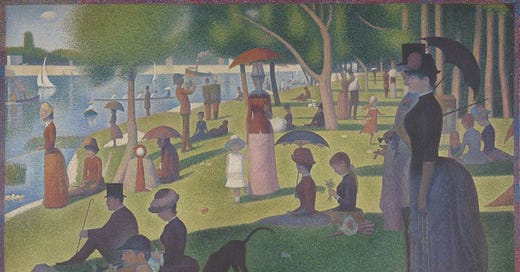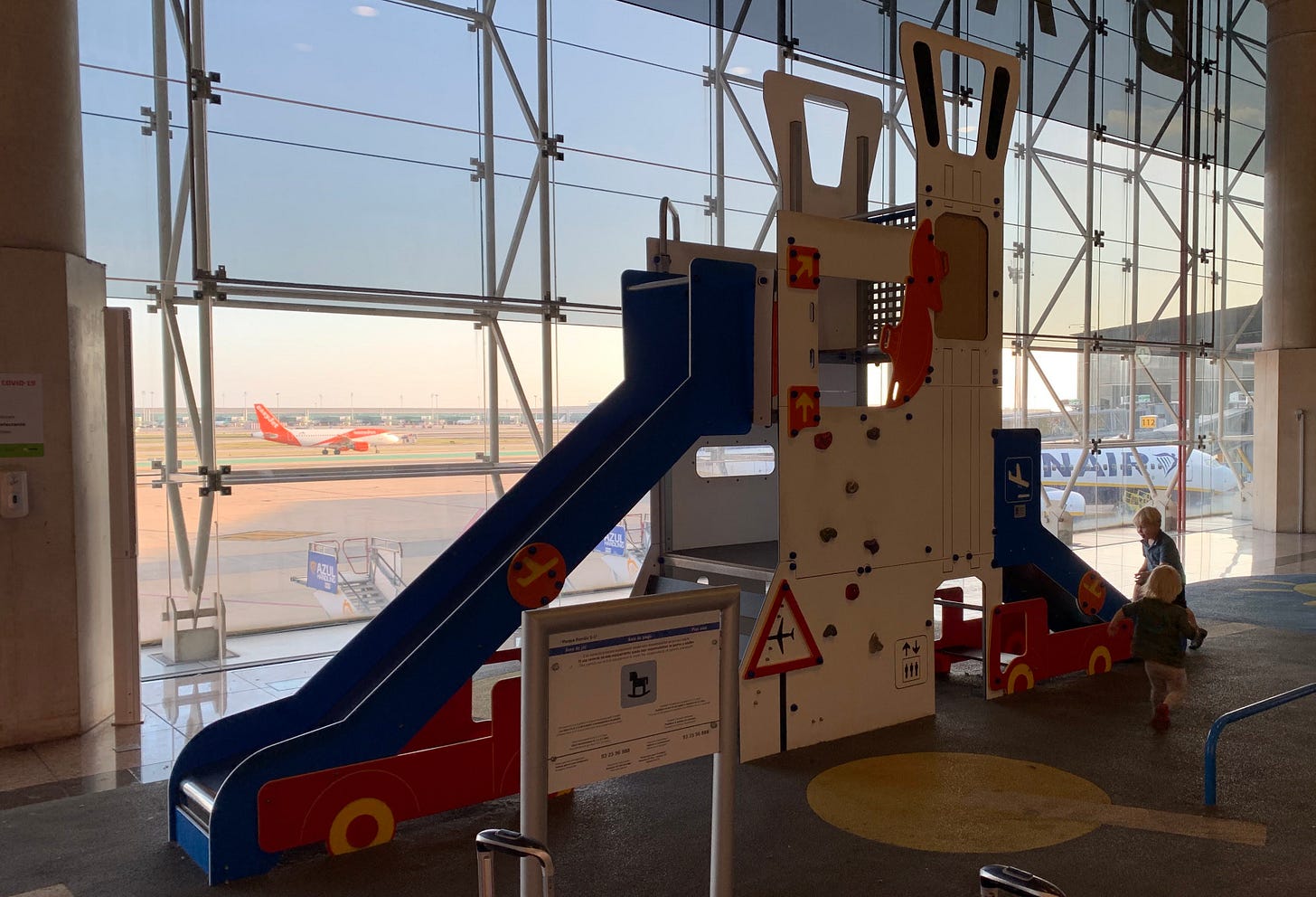Kids belong in public
Sequestering kids away from the adult world is a sad indictment on how we conceive of childhood
Thanks for checking out Nuclear Meltdown. If you haven’t subscribed this blog yet, what are you waiting for???
Last week, the Institute for Family Studies published a piece I wrote on family-friendly city design. The gist is that during a recent trip to Spain (which I previously wrote about here), I was surprised to discover playgrounds sprinkled throughout the city squares we visited. It made life great for both kids and adults — us, of course, but also and more importantly many Spanish people who were using the playgrounds as well — and is something I’d love to see us copy here in the U.S.
Then this week, the Deseret News1 ran a piece I wrote about kids and weddings2. The argument in that piece is that child-free weddings are a mistake. While child-free gatherings in general are fine, the problem is that weddings specifically are supposed to be more than just a party. They’re also rituals that involve a couple’s entire community. Leaving kids out implies they aren’t important members of those communities, and — critically — robs the kids of an important opportunity to learn the values and rites that define their people3.
These two pieces address different topics, but the unifying thread between them is a question about the role of kids in the public sphere. On the one hand, Spain’s decision to put playgrounds in squares is an argument that kids are equal stakeholders in the community and should have a place in public life. Child-free weddings make the opposite argument. Same topic, opposing viewpoints.
This issue is a hotly debated one online, and from the apparent popularity of child-free weddings to complaints about babies on airplanes, it certainly seems like there is growing pressure to keep children sequestered away from the adult world. I couldn’t find data proving that this is a thing (how does one track such a thing?), but I’m nevertheless not going to spend a lot of time building a case because I think most people — whether they are pro- or anti-kids in public — are aware that this is happening. As for me, I’m in favor of giving kids a place in public life; they can’t grow into functional members of adult society if they’re never actually exposed to adult society.
There are plenty of explanations for why kids are getting squeezed out of the public sphere, but I have a simple theory: Too few adults count kids among their closest relationships, and as fewer and fewer people have relationships with kids it becomes easier to see them as, essentially, accessories of their parents.
Let me explain:
A useful way to think about this idea is using “Dunbar’s number.” I’ve written about this concept before, but the idea comes from Oxford’s Robin Dunbar, who theorizes that most people have about 150 relationships — or, in other words a social sphere roughly the size of a village4. Dunbar’s number comes up in the media from time to time, but a nuance that’s often missed is that not all 150 relationships are equal. Dunbar instead has argued for concentric relationship rings; the inner most ring of best friends and close family members might only have three or four people in it. Meanwhile, the outermost ring of relationships might be populated by casual acquaintances or coworkers. The idea is layers of intimacy.
What seems clear to me is that many people have no children in their innermost circles. The child-free wedding trend illustrates this; often when people argue that kids should be included in weddings, the kid-free rejoinder is that parents who can’t leave their kids at home just shouldn’t attend the wedding at all.
That’s a fine argument if we’re talking about, say, the wedding of an old college roommate, or your boss’ nephew. But I can’t just not attend the wedding of, say, a sibling or parent. In other words, attendance is mandatory when it’s a wedding for one of your closest relationships. And that means when someone says “just don’t attend” what they’re really saying is “you’re not one of the closest and most essential people in my village.”
There’s nothing wrong with being a peripheral person in a particular community. We all occupy that role to someone. What’s curious, though, is that for vocal proponents of child-free weddings, all the parents and kids seem to occupy peripheral roles. There are no nieces and nephews in those innermost relationship circles. There are no people with kids who are so close to the marrying couple that their attendance is essential. The child world exists only on the margins of the adult world.
I’m using weddings as an example here, but I think this concept speaks to a broader trend. For my Deseret News piece, for example, I interviewed Patrick T. Brown, a fellow at the Ethics and Public Policy Center, who points out that children are increasingly and unfortunately perceived to exist outside the norm.
At the time we spoke, Brown had recently retweeted a photo of a local business with a sign announcing that it is “dog friendly, child free.” I don’t know much about that business (it looks like a coffee shop in the U.K.), but I’m guessing owners of such shops don’t have kids who come in after school to do homework in a back booth. I’m betting they don’t have nieces or nephews or neighbor kids who pop in everyday to buy a cookie on their walk home from school. The only reason you ban kids from your store is because you make the calculation that doing so will have minimal costs — a calculation premised on the assumption that kids already only exist on the margins.
In other words, it’s not just that kids are disappearing from public life, it’s that they’re already so absent that people feel there’s nothing lost by banishing them.
I have many theories as to why this is happening. Smaller family sizes of course mean that in many communities there are fewer kids relative to the number of adults. Also, people having children at older ages stretches out generations, meaning people might spend more of their adult life without young nieces, nephews, or grandkids in the picture.
But whatever the causes — and I’m sure they are legion — the result of more adults lacking relationships with kids is that the way we conceptualize kids has changed. The writer Freddie deBoer captured this idea recently when he contrasted the idea of having kids with the ever-popular-in-the-media notion that a person should pursue self-gratification above all other things. The problem with this idea, he pointed out, is that eventually everyone gets old and frail and unattractive, at which point it’s useful to have family who’ll stick around and help take care of you. Having kids was traditionally an important part of surviving old age. The “point” of having kids isn’t emotional fulfilment, it’s survival5.
The further from this idea we drift, the easier it is to banish kids from public life because their only purpose becomes fulfilling some selfish need their parents felt. That “dog friendly, child free” cafe epitomizes this. Sometimes I’ve heard people complain that some folks today treat dogs more like kids, but the reverse is also true: Kids are treated more like dogs. They’re an optional accessory that might bring fulfilment to an owner’s life, but who also aren’t presumed as having any larger social benefit, rights, or claim on the public sphere. And no one has an inherent right to bring their annoying accessory into a public space.
All of which is a long-winded way to say that the pushing of kids out of public places results when kids are viewed as the accoutrements of self-interested adults. And just like I can play loud music or have a yappy dog or smoke cigarettes in private, I can have kids. But the presumption is that I should restrict all of those annoying things to my private space.
Needless to say, I don’t think kids should be relegated to the same role as dogs, loud stereos, or cigarettes. They do bring their parents fulfilment, sure, but they also serve many other functions — which is also why they ought to matter to adults whether those specific adults are parents or not.
Luckily, there are examples that contrast with that kid-free, dog-friendly cafe. I wrote about playgrounds in city squares in my IFS piece, but I wanted to highlight a couple of other fun examples I’ve seen recently. The first falls into the same genre: Like many of the public squares in the surrounding city, the Barcelona-El Prat Airport also has multiple playgrounds:
Putting playgrounds in airports is a no-brainer to me and I don’t understand why this isn’t adopted everywhere. It made waiting for flights vastly more enjoyable both for our family, and for everyone else because the kids were entertained and not acting like yappy dogs. But more importantly, it was a potent signal that kids are welcome to fly. Air travel is one of the primary kids-in-public battlegrounds, and so I found it symbolically meaningful and unambiguous that the airport dedicated space to playgrounds.
The second example I want to mention here also has to do with travel:

 Tiktok failed to load.
Tiktok failed to load.Enable 3rd party cookies or use another browser
That video shows a train in Finland that has an entire car dedicated to kids. The car includes a slide, books, toys, and stroller parking, all of which surely make life better for both kids who are traveling and everyone around them. And like the airport playgrounds in Spain, the kid car on the train is a powerful reminder to everyone that kids deserve to travel, and exist in public, just like everyone else.
Thanks for reading to the end of this post. If you’ve enjoyed Nuclear Meltdown, try sharing it with a friend.
I held this post until Monday so that I could include the Deseret News piece, which went live Sunday, in the discussion here.
Lest you think I’m a really prolific or fast writer, both of these pieces were long-gestating and ended up going live around the same time purely by coincidence.
Adding my usual caveat here of do whatever you want.
Friends: Understanding the Power of our Most Important Relationships Kindle Edition. Robin Dunbar. 2021.
Some people chafe at this idea of expecting one generation to care for the next, but whether right or wrong that is how life has worked and typically still does work. And in any case, the chafing seems to ignore the fact that care-giving is an important and rewarding part of the human experience, as Elissa Strauss recently noted in her book.





Great piece, Jim. When my kids were small, I had to develop a tolerance for noise and activity levels and so many other challenges which, until then, hadn’t been part of my life. Having kids helped me discover that I wasn’t as wonderful a person as I thought I was—and that I needed to grow in ways I never thought possible. Therein lies the magic of raising children: they are humbling.
"They’re an optional accessory that might bring fulfilment to an owner’s life, but who also aren’t presumed as having any larger social benefit, rights, or claim on the public sphere. And no one has an inherent right to bring their annoying accessory into a public space."
Yes. We were all once children, and children are people too, so it's wild they get relegated to second-class citizens.